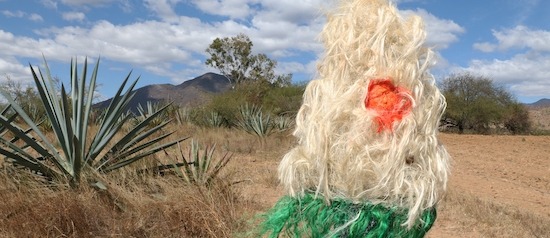
Resiliencia Tlacuache (2019), courtesy director Naomi Rincón Gallardo
VIRTUAL CINEMA
New Nature Shorts
December 3–11, 2020Online screening of 12 short films curated by Samara Chadwick and Sonia Epstein, Associate Curator of Science & Film
This program of films confronts the human conception of “nature” and explores all that is unnamable, unknowable, and wild. It assembles twelve audiovisual works by contemporary artists, filmmakers, technologists, and scientists based in Germany, Canada, Mexico, and the United States. Screened together, these films interrogate the inherent anthropocentrism of cinema, often by riffing or subverting the conventions of nature films. With their intricate soundscapes; airborne and microscopic perspectives; and realms imprinted by lichen, bacteria, fur, dirt, and slime, these films work with their subjects rather than merely being about them. The camera gives us passage to realms shimmering with indigenous mysticism, interspecies symbiosis, and sublime symmetries.
RSVP here for either program or both. The films will be available for free online, through a unique link to MoMI’s Vimeo page, from December 3–11. They will receive a unique link, which will allow them to view the entire series online for the duration of one week.
This program is a co-presentation of the Goethe-Institut and Museum of the Moving Image as part of New Nature, a project realized with the support of the Federal Foreign Office of Germany.
About New Nature
New Nature is a series of encounters over the course of 2020 between contemporary artists, filmmakers, creators of VR and immersive video, technologists, and climate scientists from Germany, Canada, the U.S., and Mexico. The project is an initiative by the Goethe-Institut Montreal, realized with the support of the Federal Foreign Office of Germany, in partnership with the National Film Board of Canada, Centre Phi, Milieux Institute at Concordia University, Museum of the Moving Image, Massive Science, XR HUB Bavaria, UnionDocs Center for Documentary Art and Retune - Creative Technology Platform.
Program I
79 mins.
These collected works—in which filmmakers use the camera as a microscope, a periscope, and an additional limb, allowing us to access life-forms, scales, textures, and wisdom that otherwise evade knowability—allow us to peer beyond the frontiers of our human experience.
Parallele I. Dir. Harun Farocki. 2012, 16 mins. A look at the history of computer graphics since the 1980s and how they have represented landscapes.
Lichen. Dir. Lisa Jackson. 2019, 11 mins. Often overlooked, lichen loom large in Lisa Jackson's otherworldly film that suggests what we might learn from organisms that live in such dynamic tension with their environment.
Coatl (Snake). Dir. Colectivo Los Ingrávidos. 2015, 2 mins. This is the path from the snake’s perspective.
Still Life. Dirs. Florian Fischer and Johannes Krell. 2014, 12 mins. In this film, beautifully shot in Germany's Harz National Park, animals gaze directly into the camera—conventionally a faux-pas of nature documentaries—signalling the ways in which nature is often staged.
Holobiont. Dir. Jenna Sutela. 2018, 10 mins. Holobiont considers the idea of embodied cognition on a planetary scale, zooming from outer space into the gut.
Parallele III. Dir. Harun Farocki. 2014, 7 mins. Parallele III seeks out the boundaries between the game world and the built environment it often depicts.
Europium. Dir. Lisa Rave. 2014, 21 mins. Rave weaves a narrative around the rare earth element Europium, named after the European continent, which can be mined from the seafloor and has a history in Papua New Guinea's colonial past.
Program II
85 mins.
Non-human animals are sick of the violent prioritizing of human needs. In this selection of films, nature’s critters are an insolent, furious, contradictory force, uncontained despite various attempts to control or classify them.
A Demonstration. Dirs. Sasha Litvintseva and Beny Wagner. 2020, 25 mins. A monster film without monsters, A Demonstration is inspired by the existence of taxonomies of monsters at the heart of early modern European science.
Nobody Loves Me. Dirs. Farihah Zaman and Jeff Reichert. 2017, 12 mins. High in Lake Titicaca in the Andes Mountains, a frog with an unfortunate appearance is critically endangered. A film that asks, should only the cute survive?
Pedro Malheur (Pedro Misfortune). Dir. Camila Beltrán. 2014, 18 mins. This is the story of Pedro, a donkey who one day decides to escape from his home in a garage in downtown Tijuana.
Resiliencia Tlacuache (Opossum Resilience). Dir. Naomi Rincón Gallardo. 2019, 16 mins. Grounded in the valley of Oaxaca, Mexico, Gallardo’s film summons the opossum to provide an activist with the mythical powers to play dead and revive.
Garden of the Legend of the Golden Snail. Dir. Oliver Husain. 2019, 14 mins. Following the graceful snail through myth and place, Oliver Husain's film returns to the opening of the Keong Emas (Golden Snail) in 1984, the first IMAX theater in Indonesia, which was also meant to promote the Golden Apple snail to farmers as a new source of protein.


